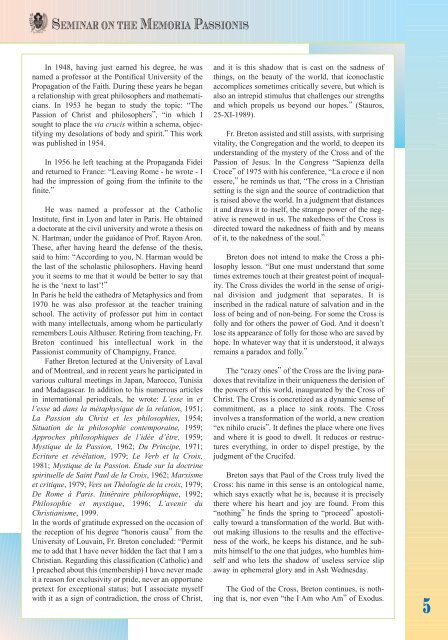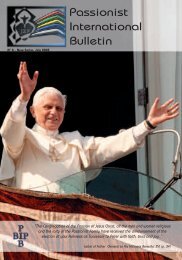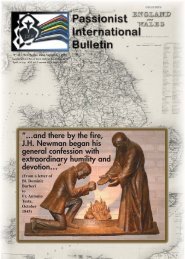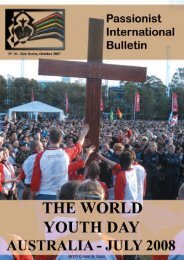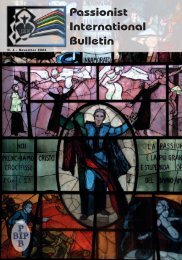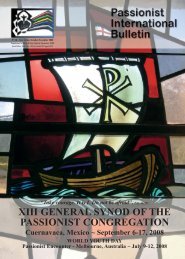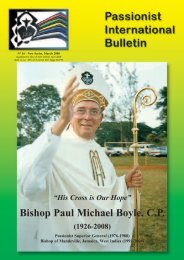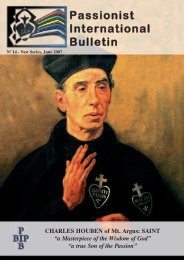Passionist International Bulletin
Passionist International Bulletin
Passionist International Bulletin
Create successful ePaper yourself
Turn your PDF publications into a flip-book with our unique Google optimized e-Paper software.
seminar on the memoria passionisIn 1948, having just earned his degree, he wasnamed a professor at the Pontifical University of thePropagation of the Faith. During these years he begana relationship with great philosophers and mathematicians.In 1953 he began to study the topic: “ThePassion of Christ and philosophers”, “in which Isought to place the via crucis within a schema, objectifyingmy desolations of body and spirit.” This workwas published in 1954.In 1956 he left teaching at the Propaganda Fideiand returned to France: “Leaving Rome - he wrote - Ihad the impression of going from the infinite to thefinite.”He was named a professor at the CatholicInstitute, first in Lyon and later in Paris. He obtaineda doctorate at the civil university and wrote a thesis onN. Hartman, under the guidance of Prof. Rayon Aron.These, after having heard the defense of the thesis,said to him: “According to you, N. Harman would bethe last of the scholastic philosophers. Having heardyou it seems to me that it would be better to say thathe is the ‘next to last’!”In Paris he held the cathedra of Metaphysics and from1970 he was also professor at the teacher trainingschool. The activity of professor put him in contactwith many intellectuals, among whom he particularlyremembers Louis Althuser. Retiring from teaching, Fr.Breton continued his intellectual work in the<strong>Passionist</strong> community of Champigny, France.Father Breton lectured at the University of Lavaland of Montreal, and in recent years he participated invarious cultural meetings in Japan, Marocco, Tunisiaand Madagascar. In addition to his numerous articlesin international periodicals, he wrote: L’esse in etl’esse ad dans la métaphysique de la relation, 1951;La Passion du Christ et les philosophies, 1954;Situation de la philosophie contemporaine, 1959;Approches philosophiques de l’idée d’être, 1959;Mystique de la Passion, 1962; Du Principe, 1971;Ecriture et révélation, 1979; Le Verb et la Croix,1981; Mystique de la Passion. Etude sur la doctrinespirituelle de Saint Paul de la Croix, 1962; Marxismeet critique, 1979; Vers un Théologie de la croix, 1979;De Rome à Paris. Itinéraire philosophique, 1992;Philosophie et mystique, 1996; L’avenir duChristianisme, 1999.In the words of gratitude expressed on the occasion ofthe reception of his degree “honoris causa” from theUniversity of Louvain, Fr. Breton concluded: “Permitme to add that I have never hidden the fact that I am aChristian. Regarding this classification (Catholic) andI preached about this (membership) I have never madeit a reason for exclusivity or pride, never an opportunepretext for exceptional status; but I associate myselfwith it as a sign of contradiction, the cross of Christ,and it is this shadow that is cast on the sadness ofthings, on the beauty of the world, that iconoclasticaccomplices sometimes critically severe, but which isalso an intrepid stimulus that challenges our strengthsand which propels us beyond our hopes.” (Stauros,25-XI-1989).Fr. Breton assisted and still assists, with surprisingvitality, the Congregation and the world, to deepen itsunderstanding of the mystery of the Cross and of thePassion of Jesus. In the Congress “Sapienza dellaCroce” of 1975 with his conference, “La croce e il nonessere,” he reminds us that, “The cross in a Christiansetting is the sign and the source of contradiction thatis raised above the world. In a judgment that distancesit and draws it to itself, the strange power of the negativeis renewed in us. The nakedness of the Cross isdirected toward the nakedness of faith and by meansof it, to the nakedness of the soul.”Breton does not intend to make the Cross a philosophylesson. “But one must understand that sometimes extremes touch at their greatest point of inequality.The Cross divides the world in the sense of originaldivision and judgment that separates. It isinscribed in the radical nature of salvation and in theloss of being and of non-being. For some the Cross isfolly and for others the power of God. And it doesn’tlose its appearance of folly for those who are saved byhope. In whatever way that it is understood, it alwaysremains a paradox and folly.”The “crazy ones” of the Cross are the living paradoxesthat revitalize in their uniqueness the derision ofthe powers of this world, inaugurated by the Cross ofChrist. The Cross is concretized as a dynamic sense ofcommitment, as a place to sink roots. The Crossinvolves a transformation of the world, a new creation“ex nihilo crucis”. It defines the place where one livesand where it is good to dwell. It reduces or restructureseverything, in order to dispel prestige, by thejudgment of the Crucifed.Breton says that Paul of the Cross truly lived theCross: his name in this sense is an ontological name,which says exactly what he is, because it is preciselythere where his heart and joy are found. From this“nothing” he finds the spring to “proceed” apostolicallytoward a transformation of the world. But withoutmaking illusions to the results and the effectivenessof the work, he keeps his distance, and he submitshimself to the one that judges, who humbles himselfand who lets the shadow of useless service slipaway in ephemeral glory and in Ash Wednesday.The God of the Cross, Breton continues, is nothingthat is, nor even “the I Am who Am” of Exodus.5


